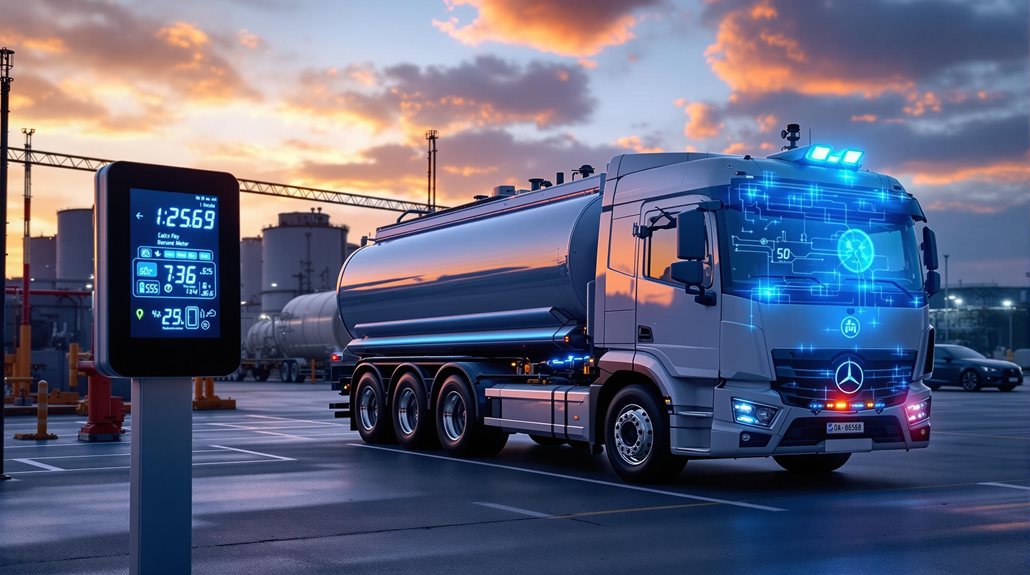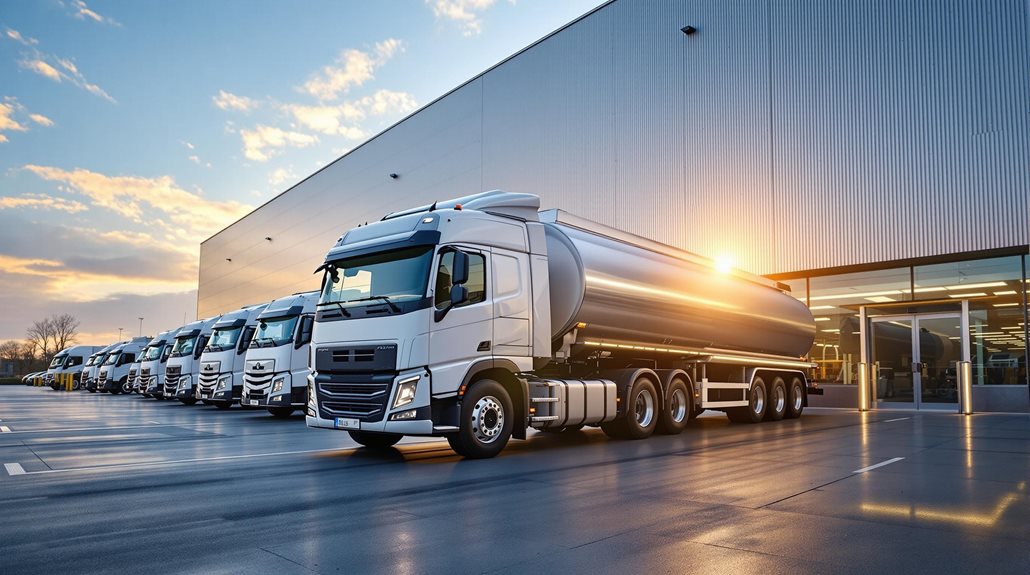Successful fuel delivery operations worldwide demonstrate innovative solutions to complex logistical challenges. In Australia's outback, mobile fuel services create employment while serving remote communities, while India's mobile petrol pumps operate across 177 locations with IoT technology. The Coast Guard icebreaker Healy's mission to escort fuel tankers to Nome, Alaska, exemplifies extreme-condition deliveries. Advanced technologies, including GPS tracking and telematics, enable precise delivery scheduling and monitoring. Environmental considerations drive the adoption of eco-friendly options and sustainable pricing models. These global achievements showcase how modern fuel delivery systems overcome geographical, technological, and environmental obstacles to maintain reliable energy access.
Expert Highlights
- Door-to-door fuel delivery services successfully operate across Australia's outback, creating jobs while serving remote communities effectively.
- India implemented mobile petrol pumps across 177 locations, demonstrating successful large-scale fuel delivery infrastructure.
- The Coast Guard icebreaker Healy's mission to escort fuel delivery to Nome, Alaska showcases extreme weather challenges.
- Remote fuel delivery services face pricing challenges but overcome them through transparent communication and sustainable pricing models.
- Mobile fuel delivery reduces carbon emissions and infrastructure costs in desert regions despite logistical complexities.
Breaking Through Market Resistance

Market resistance to fuel surcharges and cost-management strategies presents a significant hurdle for delivery operations. Through systematic negotiation processes and transparent communication with customers, organizations have successfully implemented sustainable pricing models that account for fluctuating fuel costs while maintaining customer relationships. Eco-friendly delivery options have emerged as a powerful tool for justifying pricing changes while building customer loyalty.
Companies that have broken through market resistance have consistently employed a multi-faceted approach, combining dynamic pricing options with advanced technological solutions. By offering customers flexible delivery choices and implementing sophisticated route optimization systems, these organizations demonstrate tangible value that justifies additional costs. The integration of GPS tracking and telematics provides concrete data to support surcharge calculations, while collaboration with carriers guarantees that cost increases are properly validated. One of these advanced capabilities includes real-time tracking, which ensures transparency and builds trust with customers. The utilization of real-time pricing tools enables procurement teams to make data-driven decisions that support fair surcharge implementations.
This evidence-based approach, coupled with regular contract reviews and adjustments, has proven effective in gaining customer acceptance of necessary pricing modifications.
Remote Areas Fuel Success Stories
The transformation of fuel delivery services in remote regions has revolutionized access to essential energy supplies through innovative mobile solutions and specialized transportation methods.
In Australia's outback, door-to-door fuel delivery services have become instrumental in supporting isolated farming communities and mining operations, while similar programs have successfully reached previously underserved desert communities in Africa and the Middle East. India's mobile petrol pumps are providing vital energy access across 177 locations nationwide.
These achievements demonstrate how technological advancements in mobile fueling stations, combined with sophisticated logistics networks, have enabled reliable fuel distribution to off-grid communities that traditional infrastructure could not effectively serve. Additionally, streamlined processes observed in services like those in the Twin Cities region for roadside assistance, highlight the importance of efficiency in logistics. A remarkable example occurred when Coast Guard icebreaker Healy successfully escorted a Russian tanker through hundreds of miles of thick sea ice to deliver vital fuel supplies to Nome, Alaska.
Mobile Solutions Transform Outback
Remote Australian communities have witnessed a remarkable transformation through innovative mobile fuel delivery solutions, revolutionizing access to essential energy resources across vast stretches of the Outback. These specialized services have established efficient delivery networks that guarantee consistent fuel availability while substantially reducing transportation costs and environmental impact through optimized routing systems. The implementation of these services has created numerous job opportunities across various skill levels, from drivers to logistics specialists.
The implementation of mobile fuel delivery has yielded substantial economic benefits for remote businesses and essential services, enabling them to maintain continuous operations without the logistical challenges previously associated with fuel acquisition. By incorporating advanced scheduling technologies and safety protocols, these services have not only enhanced operational efficiency but have also contributed to the region's environmental sustainability through reduced collective fuel consumption and emissions, while simultaneously supporting the growth and stability of isolated communities.
Door-to-Door Desert Deliveries
Pioneering door-to-door fuel delivery services have revolutionized energy access across desert and remote regions, offering tailored solutions for diverse stakeholders including farmers, rural institutions, and commercial fleet operators. The implementation of PESO-approved mobile petrol pumps, equipped with IoT technology and sophisticated monitoring systems, guarantees seamless distribution while maintaining stringent safety protocols.
These services have demonstrated significant economic and environmental benefits through the deployment of fire-resistant bowsers and specialized delivery trucks. The integration of geo-fencing technology and digital billing systems prevents fuel pilferage, while trained personnel navigate challenging terrains to serve remote communities.
This systematic approach has resulted in reduced carbon emissions, decreased infrastructure costs, and enhanced operational efficiency for rural establishments, ultimately transforming fuel accessibility in previously underserved regions.
Reaching Off-Grid Communities
Successful fuel delivery to off-grid communities presents unique logistical challenges that require innovative distribution methods. In Western Alaska, ocean-going barges transport fuel to coastal terminals, while smaller vessels navigate shallow waters to reach remote villages, often deliberately grounding on beaches where docks are absent.
To overcome infrastructure limitations, companies employ sophisticated GPS navigation systems and satellite communications, ensuring reliable service despite poor connectivity.
The implementation of fuel monitoring systems and strategic tank farm placement has revolutionized distribution efficiency across vast rural territories. These technological solutions, combined with carefully planned delivery schedules and extended lead times, enable consistent fuel access for isolated populations.
Despite the complexities of terrain and weather, marine transport remains the most cost-effective approach, supported by real-time tracking and optimization software to maintain indispensable supply chains.
Technology Transforms Traditional Fuel Delivery

Modern technological advancements have fundamentally reshaped traditional fuel delivery systems, introducing unprecedented levels of efficiency and convenience. Through the integration of IoT-enabled smart tanks, predictive analytics, and automated delivery systems, fuel providers can now guarantee uninterrupted supply while optimizing distribution processes.
Our industry's technological transformation encompasses three pivotal developments:
- Real-time monitoring through IoT sensors that track fuel levels and trigger automated deliveries
- Mobile applications enabling customers to schedule deliveries and track their fuel consumption
- AI-powered logistics systems that optimize routes and predict maintenance needs
This digital evolution has revolutionized fuel delivery operations, with blockchain technology guaranteeing transaction transparency and automated safety protocols maintaining rigorous compliance standards. The implementation of machine learning algorithms continues to enhance distribution efficiency while reducing operational costs and environmental impact. Additionally, lockout roadside aid can ensure that emergencies do not disrupt the delivery processes by providing immediate assistance in unexpected situations.
Environmental Impact Meets Business Growth
Modern fuel delivery services demonstrate how environmental stewardship and business expansion can work in harmony, with sustainable practices driving both ecological benefits and market growth.
The implementation of route optimization technology and renewable fuel options has resulted in measurable reductions in carbon emissions while simultaneously improving operational efficiency and cost savings for businesses. These environmentally conscious delivery solutions have created new opportunities in green technology development, leading to innovative tracking systems, cleaner fuel alternatives, and smart logistics platforms that benefit both the environment and the bottom line. Furthermore, partnerships with roadside services such as on-site gas delivery have ensured a comprehensive and efficient approach to meeting consumer needs while adhering to sustainable practices.
Sustainable Delivery Solutions
Leading fuel delivery companies are revolutionizing their operations by implementing sustainable solutions that seamlessly merge environmental stewardship with business growth. Through integrated cloud-based monitoring systems and renewable fuel adoption, organizations are achieving remarkable efficiency while reducing their carbon footprint.
Key sustainable delivery implementations include:
- On-site fueling infrastructure that eliminates unnecessary transfer and reduces overall emissions
- Integration of renewable diesel and biodiesel solutions compatible with existing fleet equipment
- Real-time monitoring systems that optimize delivery routes and minimize fuel waste
These advancements demonstrate how companies can maintain operational excellence while shifting to environmentally responsible practices. The implementation of data-driven decision-making tools, coupled with cleaner fuel alternatives, guarantees businesses can meet their sustainability goals without compromising service quality or operational efficiency.
Green Tech Growth Impact
As environmental consciousness intersects with business imperatives, green technology continues to reshape the fuel delivery landscape through dual benefits of sustainability and profitability. Companies implementing IoT-based resource management systems are optimizing their delivery operations while reducing their carbon footprint through more efficient routing and reduced fuel consumption.
The integration of renewable energy sources and advanced efficiency measures in fuel delivery operations has demonstrated significant cost savings, with businesses reporting reduced operational expenses through improved energy management. Additionally, the adoption of carbon capture technologies and sustainable delivery practices has positioned forward-thinking companies to capitalize on the expanding green technology sector, which has attracted over $1.74 trillion in global investments. Despite infrastructure challenges, the shift toward greener fuel delivery solutions continues to accelerate, driven by both environmental necessity and economic opportunity.
Corporate Fleet Management Excellence

The pursuit of corporate fleet management excellence requires a thorough approach that integrates strategic planning, vehicle maintenance, regulatory compliance, and technology solutions. Successful organizations implement all-encompassing fleet management plans that encompass vehicle lifecycle analysis, preventive maintenance schedules, and data-driven decision-making processes to optimize operational efficiency. Dinkytown offers reliable roadside assistance services such as tire changes and gas delivery around the area, ensuring fleet vehicles in the region are never stranded. To achieve sustainable fleet management success, companies typically focus on:
- Developing robust maintenance strategies that incorporate both preventive and predictive approaches
- Implementing advanced fleet management software with AI capabilities for real-time monitoring
- Establishing strict compliance protocols that address federal regulations and fuel efficiency targets
Mobile Solutions During Crisis
Mobile fuel delivery solutions have emerged as critical components of crisis management strategies, enabling organizations to maintain operational continuity during emergencies and unprecedented challenges. Through scheduled fuel deliveries and bulk fuel contracts, organizations can guarantee uninterrupted operations while minimizing human contact during health crises.
The implementation of data-driven fuel management systems allows for precise tracking and optimization of fuel consumption, while multiple fuel sources safeguard against supply chain disruptions.
These mobile solutions incorporate advanced safety features and environmental considerations, including automatic shutdown systems and spill prevention technology. With 24/7 availability and swift emergency response capabilities, fuel delivery services provide essential support during power outages and transportation system failures. Organizations can also benefit from roadside assistance services to ensure continuous operations in emergency scenarios. These services ensure that critical operations continue without disruption while maintaining compliance with safety regulations and environmental standards.
Scaling Across Geographic Boundaries

Successful scaling of fuel delivery services across geographic boundaries requires strategic market analysis and technological innovation to meet diverse regional demands. Companies expanding into new territories must navigate complex regulatory frameworks while adapting their services to local market conditions.
Key factors driving successful geographic expansion include:
- Implementation of GPS-enabled fleet management systems for efficient route optimization across different regions
- Development of region-specific mobile applications that accommodate local payment preferences and language requirements
- Formation of strategic partnerships with local businesses and fuel suppliers to establish reliable distribution networks
The Asia-Pacific region presents particularly promising opportunities, with rapid urbanization and increasing vehicle ownership in countries like China and India driving demand. Meanwhile, mature markets such as Europe require different approaches, focusing on technological innovation and environmental compliance to maintain market share.
Roadside Assistance FAQ
How Long Does Driver Training Take for Mobile Fuel Delivery Operations?
Driver training for mobile fuel delivery typically ranges from 2-6 weeks, combining classroom and on-the-job instruction. Duration varies based on experience level and completion of required certifications.
What Insurance Requirements Exist for Door-To-Door Fuel Delivery Services?
Door-to-door fuel delivery services require commercial auto liability, hazmat, cargo, public liability, and environmental liability insurance coverages to meet DOT regulations and protect against operational risks.
How Do Weather Conditions Affect Mobile Fuel Delivery Schedules?
Weather conditions markedly impact fuel delivery schedules through route disruptions, safety concerns, and supply chain delays. Our drivers must adapt with real-time planning and alternative routes to maintain reliable service.
What Backup Systems Exist if Iot Tracking Technology Fails?
Multiple redundancies protect against IoT tracking failures, including internal battery backups, dual power systems, local data storage, satellite communication alternatives, and automated alert systems for continuous operational monitoring.
Can Customers Specify Preferred Delivery Windows for Recurring Fuel Orders?
Based on available information, automated fuel delivery systems don't typically offer customizable delivery windows. The system operates on predictive scheduling using usage patterns and weather data for ideal timing.
